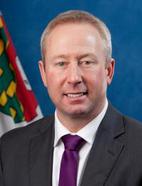Thank you, Mr. Speaker. While I appreciate that some other Members are going to speak this evening, possibly with regard to, "Maybe we could have negotiated a better deal," my position all along has been that I do not support a carbon tax, whether it is coming from this government or whether it is coming from the federal government.
I believe that we are already penalized severely for where we live. This is a dark, cold territory for eight months of the year. We are already penalized for being in this region. We are also further penalized by the cost of living. It is 20 to 30 percent more expensive to live here; other than maybe Nunavut, we are the second-highest jurisdiction in the country to afford to live in and do business in.
Thirdly, we are also penalized by not having any options, Mr. Speaker. We do not have any affordable options. We cannot decide to maybe go and buy an electric-powered vehicle, because here, unlike, say, Alberta, where it is 8 cents a kilowatt hour, our power is 38 cents a kilowatt hour. Just the affordability is not there. It just makes no sense to do that sort of thing.
We do not have cheap fuel options. We do not have natural gas like most of southern Canada has, which is much more affordable than diesel. We just clearly do not have the options. We live in a cold climate where we are penalized. We already live in a higher cost of living jurisdiction, and we don't have options to switch over to. Yet, the federal and our government feel that it is necessary to apply such a tax.
We don't need our behaviour changed, Mr. Speaker, and why? Because we are already doing good things. We were doing these good things long before a discussion of carbon tax came along.
Let's look at government. Government, through our capital asset retrofit program, has been making improvements for eons, improvements that are paying back, by the way, making energy efficiency and savings for tax payers. These have a positive return on investment.
Other orders of government are starting to look at district energy systems. We have all been putting in biomass heaters and boilers in all of our government-owned assets for some period of time now. Why? Because these are the kinds of things that we have to look at in order to lower our energy rates.
Let's talk about, for a moment, what government is doing in terms of leading by example in other areas. We have the Inuvik windmill farm that is going to be coming. We see industry using other options. Diavik has a windmill farm. We have solar panels popping up all over the place. We have communities starting to talk about new microgrids and other alternatives. We have potential for geothermal in the Deh Cho region. These are all things that we were talking about and planning and strategizing about long before anybody felt that they need to slap a carbon tax on us.
Mr. Speaker, we are also doing good things as it relates to enacting legislation and regulations. We have been doing that for a long time. Municipal governments have been doing that for a long time. EnerGuide 80 is a good thing that you can look at towards regulations that are starting to have a positive effect now. We put that in a number of years ago. People are building more energy-efficient homes.
The municipality of the City of Yellowknife now has an energy retrofit program that they are going to be able to put in place, because we enabled them through changing legislation of the Cities, Towns and Villages Act that people can now apply to and have a more affordable way in which to put energy retrofits into their house, because they, too, want to live more affordably, first and foremost, but secondly, they want to reduce their carbon footprint.
Again, we are going to be increasing the Arctic Energy Alliance's budget by nearly double over the next four years. That means that we are going to be giving more rebates back to people. That will incentivize them to put in better energy-efficient appliances, pellet boilers, and pellet stoves, maybe replace some windows, things like that.
It doesn't matter where you look, whether it's government, whether it's industry, whether it's communities, or whether it's individuals; due to where we live, and due to not having other options, we have been doing all the right things for a long, long time. It is shameful that the federal Government of Canada felt that the 100,000 people who live in the Yukon, Northwest Territories, and Nunavut, who are the ones that are most impacted by climate change, somehow needed to be slapped a tax on so that they could change their behaviour somehow. This is shameful. I will not be supporting this. Thank you, Mr. Speaker.
